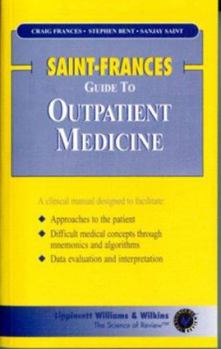Saint-Frances Guide to Outpatient Medicine
Select Format
Select Condition 
Book Overview
The Saint-Frances Guide to Outpatient Medicine was prepared and written by chief residents for third- and fourth-year medical students and residents. The use of mnemonics, tables, and algorithms makes... This description may be from another edition of this product.
Format:Paperback
Language:English
ISBN:0781726123
ISBN13:9780781726122
Release Date:January 1999
Publisher:Lippincott Raven
Length:752 Pages
Weight:1.32 lbs.
Dimensions:1.0" x 5.0" x 8.0"
Customer Reviews
5 ratings
Guide to Outpatient Medicine
Published by Thriftbooks.com User , 19 years ago
Just like the Inpatient Guide from the same authors, this is a great book. It's biggest strength is it's format; concise, well-written, and organized by chief complaint/problem. Easy to crack between patient encounters in clinic when you just need to review differential diagnosis or what tests to order to complete a workup. Helps you remember what questions to ask during history-taking. I used it extensively during outpatient clinic as a resident and in my first year of clinic practice. Well worth the money.
Saint Francis Guide is great for residents
Published by Thriftbooks.com User , 24 years ago
I was pleasantly surprised by the Saint Francis Guide to Outpatient Medicine! The content was thorough enough for my clinic, and went beyond the basics of outpatient care. What I loved most about the book was the last section of each chapter which gave recommendations for follow up care, which, as a resident is probably the hardest thing for me to decide when seeing patients in my clinic. I have already shown this book to my fellow residents and even attendings as a book everyone should own. Thank you so much for this great reference!
Outstanding outpatient reference book.
Published by Thriftbooks.com User , 24 years ago
As an ARNP, I am always searching for the perfect pocket guide to help me in my clinical practice. My office bookshelf is full of many different medical recourses covering topics from MSK injuries to Women's health. This spring, a friend gave me a copy of the Saint-Frances Guide and I can honestly say it is the best pocket guide I have found. Each section clearly guides me through an introduction to a problem, the approach to the patient, the differential, the most relevant test, and finally the most appropriate treatment.One part of the Guide I like the most is the use of algorithms and mnemonics. Many times during a busy day I don't have time to read an entire chapter. This is when I use the mnemonic. It quickly tells me the most common causes of problem, which then guides to an exam or a test I know will need to be ordered. My only wish is that this guide would have been around when I was in graduate school. It certainly would have made my clinical rotations easier and less stressful.
Review of Saint-Frances Guide to Outpatient Medicine
Published by Thriftbooks.com User , 24 years ago
A must have--like the inpatient medicine book in the same series. The only book aside from the Pocket Pharmacopoeia that you need to keep in your pocket in the outpatient setting. Excellent coverage of all major outpatient medicine topics including opthalmology, otolaryngology, cardiology, pulmonology, urology, gynecology, hematology, orthopedics, and preoperative evaluation, to name a few. Written by professors, fellows and residents from top institutions in the United States. Outstanding format for office care-relevant topics can be easily read in a couple of minutes while the patient is waiting in the exam room. Thorough and up to date with all pertinent information covered. Excellent and recent references.
My Son the Medical Student
Published by Thriftbooks.com User , 24 years ago
I'm an ARNP who recently graduated and I am now doing Outpatient Care in an office after 28 years as a nurse mostly in the Emergency Room. My son is a medical student in his third year and is less then half my age. He and I swap office tales like two newbies usually do, trying to out surprise the other. He is better at it then I am, because he sees so much more variety at his tertiary care facility then I do in a neighborhood clinic. Now he calls me up to advise me to get this book, because it has made such a difference in how he is meeting the challenge of seeing patients and organizing their care in an effective manner. He says that his residents and attending physicians are frequently surprised that he has "remembered" to ask pertinent questions, or order specific tests for that particular complaint. He says he owes it all to this book. He says he reads the short discourse the book offers for the complaint he is about to see just before he goes in to actually see the patient. The way the text is set up, it is a masterpiece of efficiency and offers useful mnemonics to remember effective approaches to these problems in the future. In the course of his short tenure he has tried several other "external brains" to be carried in his lab coat pocket, but he feels this is definatly the most useful he has experienced. He also mentioned that he has shown this book and it's systematic approach to other medical students. They have gotten the book, only to stop him in the hall to express how grateful they were to have been advised by him to get this manual. This is not typical behavior for medical students, who are frequently so competitive that a thank you is viewed as a loss of points. So on my son's recommendation I am ordering the book right now!





